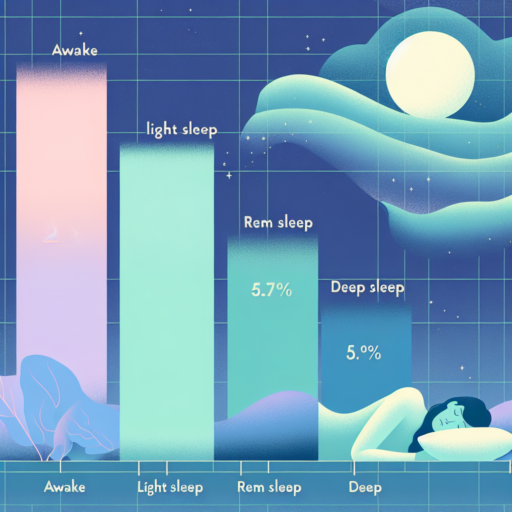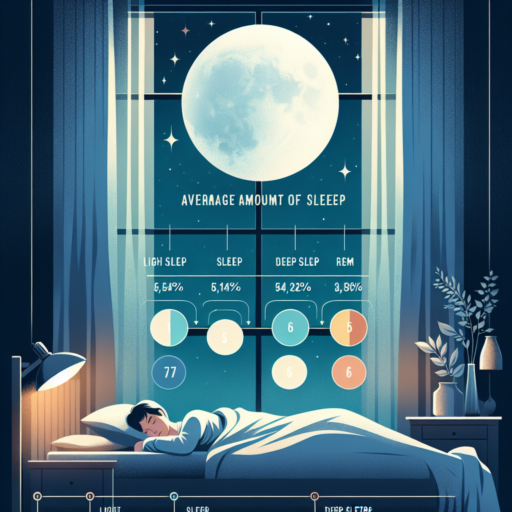What is a good proportion of deep sleep?
Understanding the ideal amount of deep sleep you need is crucial for enhancing your overall health and well-being. Deep sleep, also known as slow-wave sleep, plays a pivotal role in your body’s recovery processes, including memory consolidation, cellular repair, and energy restoration. But what constitutes a good proportion of this restorative sleep stage within your nightly sleep cycle?
Most sleep experts agree that a healthy adult should aim for a sleep cycle where deep sleep constitutes approximately 20% to 25% of total sleep. Given that the average adult sleeps for about seven to nine hours per night, this translates to roughly 90 to 120 minutes of deep sleep. This proportion can vary among individuals due to factors like age, lifestyle, and overall health.
It’s important to note that children and teenagers require a higher percentage of deep sleep, given their developmental needs. For them, deep sleep should make up a larger chunk of the sleep cycle to support growth, brain development, and physical health. The proportion can be as high as 40% during the early stages of life. As one ages, the percentage of deep sleep decreases, underscoring the importance of optimizing sleep quality at every stage of life.
No se han encontrado productos.
Why am I only getting 7% deep sleep?
Understanding the intricacies of sleep can sometimes feel like deciphering a complex puzzle, especially when it comes to deep sleep. Deep sleep, also known as the stage of sleep responsible for physical restoration, is crucial for feeling rested. If you find yourself only achieving 7% of deep sleep, it could be attributed to several lifestyle and health factors. This segment aims to unpack some common reasons behind this phenomenon.
Lifestyle Factors Influencing Deep Sleep
Our daily activities have a profound impact on our sleep architecture. High levels of stress, exposure to blue light from screens before bedtime, and irregular sleep schedules can significantly reduce the amount of deep sleep we get. Consuming caffeine late in the day or engaging in heavy physical activity close to bedtime can also disrupt the natural sleep cycle, leading to reduced deep sleep. Creating a pre-sleep routine that promotes relaxation can be a pivotal step towards enhancing the quality of your rest.
Health-Related Causes
It’s also important to consider potential health issues that could be limiting your deep sleep percentages. Conditions such as sleep apnea, restless legs syndrome (RLS), and even chronic stress can dramatically affect your sleep stages. These conditions often lead to fragmented sleep, preventing you from reaching or maintaining deep sleep for sufficient durations. Consulting with a healthcare provider can help identify and address these underlying health concerns.
Is 30% of deep sleep too much?
When considering the structure of a healthy sleep cycle, understanding the role and recommended amount of deep sleep is crucial. Deep sleep, also known as slow-wave sleep, is a restorative phase of the sleep cycle that allows for physical recovery, memory consolidation, and various health benefits. A common question among those seeking to optimize their sleep quality is whether achieving 30% of their sleep in the deep sleep stage is considered excessive.
In the realm of sleep science, the percentage of deep sleep an individual requires can vary significantly depending on several factors including age, lifestyle, and overall health. Typically, adults are expected to spend approximately 15-25% of their sleep in the deep phase. This suggests that while 30% may be on the higher end of the spectrum, it is not necessarily too much, especially for those engaged in high levels of physical activity or undergoing periods of increased stress.
Factors contributing to higher percentages of deep sleep include consistent exercise, maintaining a healthy diet, and adhering to a regular sleep schedule. However, an unusually high percentage of deep sleep, such as 30% or more, may sometimes reflect an underlying health issue or a compensatory response to sleep deprivation. It’s important to monitor other aspects of sleep quality and consult with a healthcare provider if drastic changes in sleep patterns occur.
Is 20% deep sleep enough?
Understanding the importance of deep sleep is crucial for overall health and wellness. Deep sleep, or slow-wave sleep, plays a pivotal role in the body’s recovery process, aids in memory consolidation, and rejuvenates you for the following day. But, when it comes to quantifying how much of this restorative sleep stage is necessary, the percentage can seem ambiguous. The question on many minds is: Is 20% deep sleep enough?
Experts suggest that for adults, achieving 20% of your sleep in the deep phase is a benchmark to aim for. This means that in a typical 8-hour sleep period, roughly 1.6 hours should be dedicated to deep sleep. This duration is considered sufficient for most individuals to reap the benefits such as physical recovery, immunity boosting, and growth hormone release. However, it’s important to note that individual needs may vary, influenced by factors such as age, lifestyle, and overall health.
Optimizing the amount of deep sleep can be approached through various methods, including maintaining a consistent sleep schedule, creating a restful environment, and avoiding stimulants before bedtime. Sharing insights and tips on improving sleep quality can further elucidate how one might increase their percentage of deep sleep, ultimately enhancing health and wellbeing.




